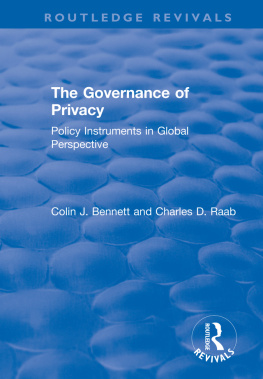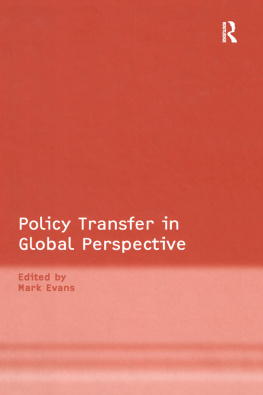First published 2003 by Ashgate Publishing
Reissued 2018 by Routledge
2 Park Square, Milton Park, Abingdon, Oxon OX14 4RN
711 Third Avenue, New York, NY 10017, USA
Routledge is an imprint of the Taylor & Francis Group, an informa business
Copyright Colin J. Bennett and Charles D. Raab 2003
All rights reserved. No part of this book may be reprinted or reproduced or utilised in any form or by any electronic, mechanical, or other means, now known or hereafter invented, including photocopying and recording, or in any information storage or retrieval system, without permission in writing from the publishers.
Notice:
Product or corporate names may be trademarks or registered trademarks, and are used only for identification and explanation without intent to infringe.
Publisher's Note
The publisher has gone to great lengths to ensure the quality of this reprint but points out that some imperfections in the original copies may be apparent.
Disclaimer
The publisher has made every effort to trace copyright holders and welcomes correspondence from those they have been unable to contact.
A Library of Congress record exists under LC control number: 2002112506
ISBN 13: 978-1-138-71002-3 (hbk)
ISBN 13: 978-1-315-19926-9 (ebk)
This book is the culmination of over a decade of collaboration on research on privacy protection policy. At the end of the 1980s, our mutual interests and prior work led us to start thinking about writing a lengthy analysis of data protection based upon the experiences of the United Kingdom (UK), whose Data Protection Act had been legislated in 1984 and was still in the relatively early days of implementation. As political scientists, we thought we could build upon the work of lawyers, computer scientists, social theorists and philosophers, but take it in a different direction, one that was more in line with the preoccupations and analytical outlooks of empirical social science and policy studies. We thought it would be a fresh approach to consider the various roles of the UK's Data Protection Registrar as the regulatory instrument responsible for overseeing the Act, and to consider different facets of the privacy protection afforded to a 'data subject' caught up in various domains of data processing. We interviewed officers of leading UK data-using organizations in a variety of industries, as well as regulatory officials and consumers' spokespersons, and collected a vast quantity of written documents. We also attended practitioners' conferences and other gatherings where we were able to observe the discourse and debates of the various policy protagonists as well as to make contacts with many who would be able to help as informants and interviewees. These activities gave us a great deal of material to analyze over the first few years of research.
As the 1990s evolved, however, the landscape of data protection changed dramatically, and so did our conception of the book. For one thing, the policy agenda of data protection was deeply affected by the emergence in draft form of the European Union Data Protection Directive early on in our work, by the political debates it engendered, and by its subsequent revisions. Secondly, the development of the Internet, and especially the World-Wide Web, had a transformative effect on the subject under study. Once again, it moved the centre of gravity further away from the experiences of one country and broadened the array of issues and analytical perspectives. But it also posed sharper questions about the relationship between technological change, globalization and privacy protection. This gave an object lesson of the predicament of trying to research policies and developments in a field where the pace of change - technological, legal, political, economic and others - is extremely rapid. Whilst continuing our research, we revised our framework of issues several times, each outline losing its lustre with the further development of both our thinking and the world of privacy protection. Some anchors in a shifting sea were provided by the continued prominence on the scene of many of the same groups and policy actors, although new organizations at various levels continued to enter the policy arena.
Our involvement in other research and practical endeavours within the scope of the subject and outside meanwhile helped us to deepen and broaden our ideas and knowledge. Colin Bennett's intensive policy-related work on the Canadian privacy standard and on a possible equivalent at the international level drew his attention to
We have incurred a large number of debts in the preparation of this book. Not the least are the funding bodies whose indispensable and generous assistance has underwritten our efforts to amass and to analyze a very large amount of data within several projects that have contributed, directly or indirectly, to the production of this book. First, we acknowledge with gratitude the early assistance of the Nuffield Foundation (UK) and the Moray Fund of the University of Edinburgh, which sustained our ability to carry out a large, initial wave of interviews and document collection. Subsequent funding from the Social Science and Humanities Research Council of Canada as well as temporary release from teaching and administrative duties. Colin Bennett was fortunate to spend a sabbatical year at the Harvard Information Infrastructure Project at the Kennedy School of Government, and was therefore able to draft some of the chapters within one of the richest and exciting intellectual environments in the world for the analysis of the social impacts of information technologies. For a short time, Charles Raab was Visiting Professor at Tilburg University in the Netherlands, where the Centre for Law, Informatization and Public Administration provided a supportive and congenial environment for similar writing, and for discussing the book's topics with scholars who are at the forefront of multidisciplinary research on issues related to our concerns.
We cannot name here the hundreds of persons who have assisted us m one way or another over many years. A large number were the subject of formal interviews which have informed the background of our analysis, while others gave us the benefit of their knowledge, views and further contacts, in less formal discussions and conversations. Our endeavours were encouraged and supported by a wide variety of fellow academics as well as practitioners. Many of them shared their knowledge of specialized topics in the broad field of information policy and politics, and commented usefiilly and critically on our ideas. None is, of course, responsible for any errors or for our interpretations.
At the risk of invidious mention of just a few members of this vast network, we should particularly like to thank (in alphabetical order) Francis Aldhouse, Diana Alonso Bias, Jonathan Bamford, Bojana Bellamy, Christine Bellamy, Peter Blume, Monica den Boer, John Borking, Daniele Bourcier, Vivian Bowern, Ulf Brnhann, Giovanni Buttarelli, Herbert Burkert, Ann Cavoukian, Ulrich Dammann, Alexander Dix, Wim van de Donk, Brbel Dorbeck-Jung, Stewart Dresner, Jos Dumortier, Dag Elgesem, David Flaherty, Brian Foran, Elizabeth France, Robert Gellman, Marie Georges, Gordon Graham, Jan Holvast, Melanie Howard, Eric Howe, Peter Hustinx, Rosemary Jay, Stephen Lau, Klaus Lenk, Laura Linkomies, Gustav Mahler, Lszl Majtnyi, Viktor Mayer-Schnberger, Dame Sheila McKechnie, Michael Moran, Jim Norton, Margriet Overkleeflt-Verburg, Pablo Palazzi, Stephanie Perrin, Nick Platten, Yves Poullet, Chris Pounder, Corien Prins, Priscilla Regan, Joel Reidenberg, Simon Rogerson, Paul Schwartz, Spiros Simitis, David Smith, Ignace Snellen, Michael Spencer, Blair Stewart, Graham Sutton, Ivan Szekely, Alastair Tempest, Raymond Wacks, Stefan Walz, Nigel Waters, John Woulds and Perri 6. We have also been very fortunate to have had the research assistance of Martin French, David Todd and Peter Walker at the University of Victoria, and of Gary Williams at the University of Edinburgh.














